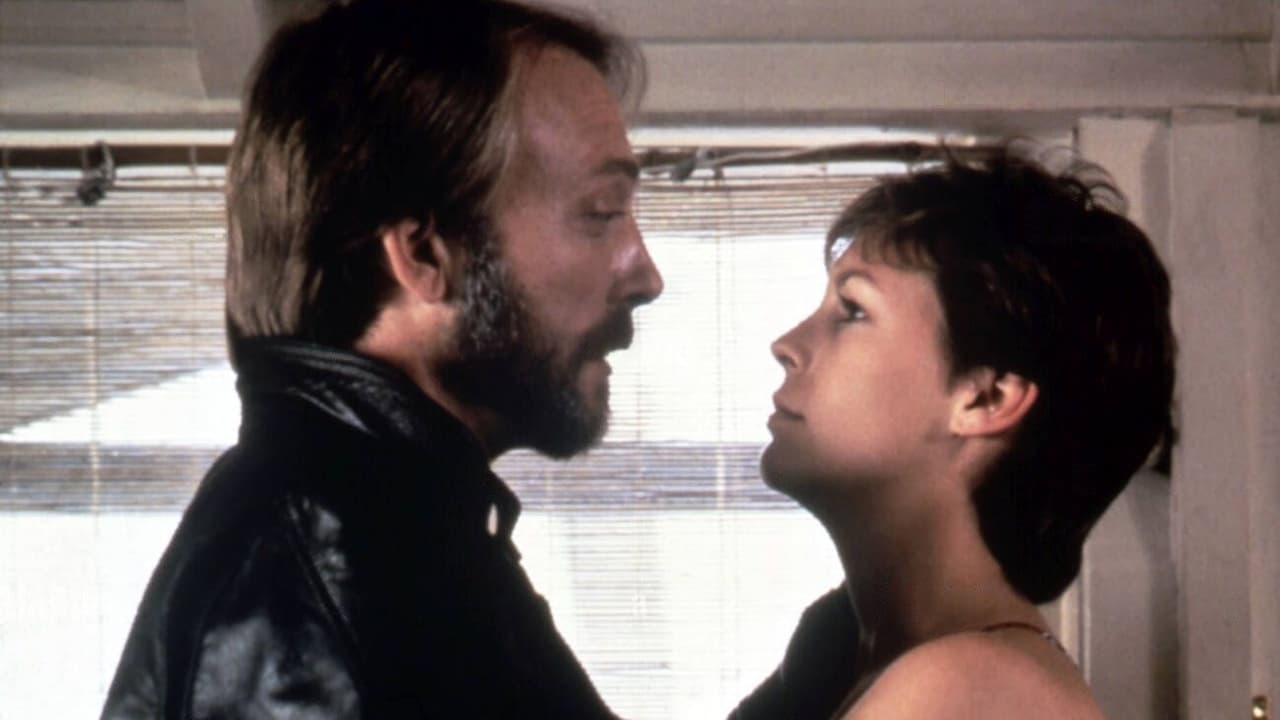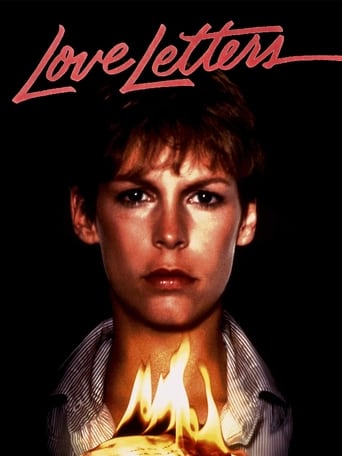

After learning (from posthumously discovered love letters) that her late mother had for some time been involved in a romantic extra-marital affair, an impressionable LA disc jockey embarks on a similar liaison, with less than satisfactory results (for both herself and the film). Jamie Lee Curtis portrays a character obviously less intelligent than she first appears; married lover James Keach wasn't given a character at all; and the sparks meant to ignite between them fizzle rather than fly. It's too bad the rare chance to see a love story told from a woman's point of view was wasted on such a conventional romance, in which the protagonist is unable to define herself beyond her (purely physical) relationship with an undeserving man. Even worse: there's a distinct suggestion at the end of the film that she only chose the wrong guy. A cast of familiar faces all but disappears in superfluous supporting roles.
... View MoreOne need not watch the movie to know how this story ends: "love" doesn't matter and is totally irrelevant to anything. The cards are always stacked against The Other Person. Always. Happily, we have Love Letters to never let us forget.If you're going to watch this movie for "!! HOT JLC topless scenes !!", you're missing out. If you're watching it to complete your Roger Corman collection, you're really missing out.Watch it if you like feeding the geese on the river.Watch it if you've lived a little and realize that the idea of "true love" is the product of an empty, irreconcilable lack.But whatever you do, don't watch it for the soundtrack. Synthesized marimbas and glockenspiels, and Ralph Jones's proto-Michael Nyman piano arrangements will ruin any seriousness the movie tries to impart.Watch it instead for the utterly bleak commentary on male-female relations, whether father/daughter, colleague/colleague, girlfriend/boyfriend and especially husband/wife.If you're a JLC die-hard -- or at least the kind of JLC die-hard who knows there is more to life than chasing after upper torso shots -- consider also the connections to Blue Steel (1990). Particularly the retribution fantasies against an abusive (and in this case, also anti-Asian racist, and alcoholic) father, as well as the theme of a young intelligent heterosexual woman, as yet completely unable to make any intelligent choices with regards to the males in her life. No doubt, reassuring for the anti-feminist/giggling misogynist crowd. Though, unlike Megan Turner, Anna does have at least one normal relationship, with her close friend Wendy, who seems to have traveled around a few blocks in her life and is truly capable of offering her some advice.Instead, in Love Letters, Anna's rejection of a conspicuous but understated incestuous desire on the part of a father wracked by inadequacy issues -- that beleaguered slob, fool enough to marry for that eternal game of whack-a-mole called "love" -- is implied by her consistent impatience with his violence, alcoholism, racism, and inappropriate physical proximities. To complete the cycle-to-be-broken, a flashback to her father repeating the same confused admonitions he'd yelled at Anna earlier that night: "What did I do, did I touch you!", "You're just like her!!" in a scene of domestic violence. Was her mother's 15 year long affair the cause of his enraged, repressed wino-nastiness, or a result, or totally unconnected altogether? The audience is rather effectively left to guess.There are also a couple throwbacks to Halloween (1978) as JLC plays another dorked-out though successful "geek girl" type - what 22 year old in 1983 Los Angeles is going to be a DJ who spins Beethoven and likes electronic drone music?? Right on to that! We're also left to wonder about that 5 inch scar on Anna's left arm, hmm..hey wait, where'd that come from, gee...Thumbs up also to: the poster for Dance Theater of Harlem in the radio station, the early tablecore from the old Alpha Syntauri Computer Music System, and the quasi-intellectual nods to Walter Benjamin and Peter Berger.Though Love Letters ends by wrapping itself in conventional wisdom, the moral of this story is actually somewhat progressive, especially for the culturally reactionary Reagan/Bush/Thatcher/Botha mid-80s: While socially-imposed conservative conventionality is not a prerequisite for "love", the chemistry between the two individuals is crucial (I observed very little in the Curtis-Keach mushy-porn screw scenes, in which Anna gets zero on-screen enjoyment or reciprocation, and believe it was intentional.) Reversing the gender roles, as Anna lives out her affair as dictated by love letters written by a man who has experienced such chemistry, won't work, either. If he ever leaves her for you, the cards will always be stacked against The Other Woman. Oh yes, and don't get involved with clueless, pretentious, suburban Porsche-driving married jerks who claim they are "fans", either. They will only end up consoling you with that ancient "you can do better than me" line. Don't fall for it, honey. Go out with that dorky, San Francisco-bound colleague with the glasses, instead; the one who really loves you. That's the only type of guy who can keep up with you, anyway. 7.5/10.
... View More"Love Letters" is a remarkable and enthralling piece for many reasons. It resists plot contrivance and genre strait-jacketing to concentrate on character nuance, freshness of observation, and originality of milieu. It presents it's material with clarity, intelligence, and a refreshing lack of stylistic tropes.Jaimie Lee plays a classical music DJ at a small, under-funded local radio station. One of her colleagues, a kind of hip nerd typical of the early 1980's time-frame, is played by 'Harold and Maude' star Bud Cort. He was, amazingly, 35 at the time but looks all of 20. During an in-studio performance by a home-made synth wizard (a delightful little sequence) she meets married photographer James Keach and almost immediately begins an affair. The film then follows the course of their various assignations until the inevitably messy conclusion, and it's ambiguous correlation with a cache of her dead mothers secret love letters.The film captivates with it's perceptivity. The characters seem completely 'real', in the sense that they are quirky and human, and not merely constructs required to advance the plot. Their actions and motivations are often recondite, but always believable. Particularly intriguing are Jaimie Lee's relationships with her best friend, played by the delightful Amy Madigan, and her father (Western veteran Matt Clark). Amy and Jaimie create a wonderful rapport: we immediately accept that these gals are old buddies. And Clark's father is a superbly unsettling creation. We never know for sure whether his strange outbursts and creeping, leering presence are merely a combination of his boozing and grief over his wife's death or something more sinisterly incestuous.The handling of the central sexual relationship avoids cliché and exploitation from the first meeting. The trysts are sketched with deftness and economy. Both leads are excellent. Keach plays it nicely low-key as an 'artistic' photographer turned advertising man who is, in truth, a rather selfish pseudo-intellectual bore. Curtis has never been better than here, as a tormented, passionate, almost schizophrenic character (just check her wardrobe changes from sensuous and stylish to bizarrely homely). Appearing just after her reign as the 'scream queen' of early 80's horror films, she evinces a startling, original presence, mixing controlled physicality and strength with numerous subtle character shadings. She's mesmerising, but somehow too unique to suggest a conventional 'star' presence. It's a real shame that she has not been granted such freedom since.Written and directed by former Scorsese associate Amy Jones, who also, as yet, has done nothing as captivating, 'Love Letters' is a most interesting one-off. Eschewing trite corollaries and crowd pleasing expedience, it remains a quietly forceful achievement.
... View More(Possible Spoilers) ...Flicks like this, that reveal the perspective of the women who write them more than their subject. The movie is about a young woman obsessed with understanding her dead mother, to the point that when she finds a box of letters from a former married lover, decides to have an affair with a married man just to understand her mom better. This rather seemy exercise (never touching on how much damage the girl can do to the married man's wife by doing this), is portrayed almost as a spiritual quest by Jamie Lee Curtis as she sleeps with older married man Keach, who, very interestingly, is directed as an absolute bore in love with the sound of his own voice when he gets together with other male collegues. Is this how women (at least the director) view professional men? Probably only fair, given the number of movies that must irritate women by portraying them as giggling airheads. The sex scenes between Curtis and Keach are anything but sexy, strange since this is directed by a woman as a sensitive subject, that include scenes of Keach flipping Curtis over like a pancake to change positions. There really is no plot, except Curtis' increasingly obsessive behavior and hypocricy, at one point seething at Keach, "I'm not a f**k-toy" after aggressively pursuing Keach for just that. There is a very heavy-handed "symbolic" scene where Curtis imagines killing her hopelessly alcoholic father, whom she never reconciles with. She finally meets her mother's old lover by chance at the cemetery in the final minutes of the movie, a quiet, simple man, and tells him how much she loved his letters she found. He says "I just put everything I had in them." End of movie. We are given glimpses of the letters throughout, overblown, syrupy and out of context. The rest of the movie is exactly like this; the only intriguing part is how it gives us an insight to the perception and angst some women have towards men and their behavior.
... View More